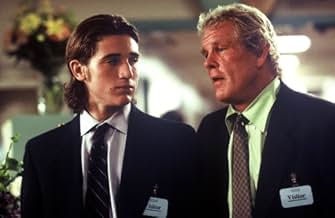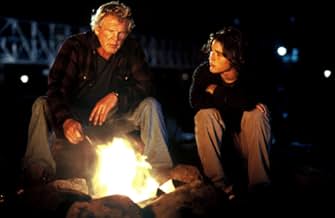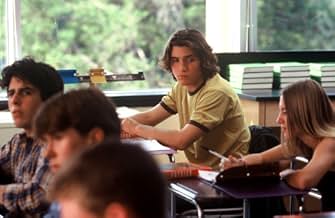IMDb-BEWERTUNG
6,5/10
1552
IHRE BEWERTUNG
Füge eine Handlung in deiner Sprache hinzuAn aging, disillusioned alcoholic (Nolte) gets a younger friend (Morgan) and wants him to pose as his son at a school reunion.An aging, disillusioned alcoholic (Nolte) gets a younger friend (Morgan) and wants him to pose as his son at a school reunion.An aging, disillusioned alcoholic (Nolte) gets a younger friend (Morgan) and wants him to pose as his son at a school reunion.
Marlyne Barrett
- Nancy
- (as Marlyne Afflack)
Empfohlene Bewertungen
I recently rented Off the Black and was pleasantly surprised how good it was considering it had not gotten much recognition in media coverage or advertisements. I find it to be another quality independent film that unfortunately seemed to slip under the radar or fall through cracks. Not only is it a finely directed tale from first time director James Ponsoldt, but the acting performances by Nolte, Morgan, and Hutton are stellar. One might expect such performances by the veterans Nolte and Hutton, but the way Morgan held his own scene for scene with these icons shows his versatility and promise as a coming of age actor soon to be recognized by all as a talented force. I thought he looked familiar so after investigating I realized he was in Mean Creek and also had a fairly long list of credits, including starring opposite Vanessa Redgrave in Rumor of Angels (another great film and another fine performance for Morgan). I am looking forward to seeing Pondsoldt's next film and the what the future holds for Morgan!
Here's my disclaimer: I am related to someone involved in the film, so I'm not completely unbiased. Having said that, I saw the preview at Sundance and I thought it was a great movie. The beginning really conveys a sense of how painfully disconnected and lacking direction Dave Tibble (Trevor Morgan) is. As the film progresses Ray Cook (Nick Nolte), in contrast to Dave's father (Timothy Hutton), shows Dave that whether or not you are completely successful the only way to really live life is to engage with its issues, without self-pity. The cast was all excellent, especially Nick Nolte; he was awesome in in this role. The conclusion of the film is bittersweet yet hopeful.
The third time is the charm for James Ponsoldt, writer, director and actor in a really touching indie film that everyone can relate to. Maybe that is why it died at the box office after a few weeks without really making it big. It's a story that we can all find a piece of ourselves in.
Ray's life is in the crapper. he runs a junkyard by day and comes home to a house where he lives with an ugly dog and they both drown their sorrows in beer. He umps the local games and know that is just asking for trouble.
After the local team loses their chance at the State playoff, he catches one teen who papers his house. This teen's mom has run off and his day is pretty much dead to the world. The two- Ray and Dave - hit it off and Ray becomes a surrogate dad, while Dave becomes a surrogate son.
It's funny, tender, and sad. It will make you think about your own life and count your friends - or make some if you don't have enough.
Ray's life is in the crapper. he runs a junkyard by day and comes home to a house where he lives with an ugly dog and they both drown their sorrows in beer. He umps the local games and know that is just asking for trouble.
After the local team loses their chance at the State playoff, he catches one teen who papers his house. This teen's mom has run off and his day is pretty much dead to the world. The two- Ray and Dave - hit it off and Ray becomes a surrogate dad, while Dave becomes a surrogate son.
It's funny, tender, and sad. It will make you think about your own life and count your friends - or make some if you don't have enough.
2006 film Off the Black pre-dates Clint Eastwood's Gran Torino by about three or so years. The tale of a lonely, elderly man living in an American neighbourhood whom forms a bond with young-'un that recently wronged him, or attempted to, works, with hindsight, close to all but just as well here. The film is dominated by a wonderful performance from Nick Nolte, a character we observe suffering from isolation in a sparsely populated neighbourhood complimenting his sparsely populated life. His character's mental health and mental well-being is placed right on the spot from the off, one instance seeing him talk directly into a tripod mounted video camera as he reminisces about the day just gone by, a sort of video diary that enables him to talk; to interact; to just get his feelings out and known even if there's nobody any where near the general vicinity of his plot of land.
Off the Black tells the story of two rather different individuals at very different points in their life. For Nolte's Ray Cook, that ability to make a cut-and-thrust decision in the heat of the moment when the stakes are rather high is demonstrated in the film's first scene when, as a line judge in a baseball match, he calls foul on a home pitcher and they consequently loose the match. Very quickly we're given the sense that this guy is not afraid of making a call. As the film progresses, his efficiency to function as someone as honest and clear-cut dawn on us that these things may have contributed to his current situation. The pitcher, a certain Dave Tibbel (Morgan) who's still a high school student in comparison, takes it on with a few buddies to wreck a revenge on Cook's house – ultimately something that has more of an impact on Tibbel's life than he first presumed. Off the Black sees writer/director James Ponsoldt apply a very gradual, very natural arc to proceedings in using his ability to determine just how far Tibbel's inner-feelings are manifesting by providing a strand documenting the downfall in his friendship with his high-school pals as a friendship with Cook develops.
The beauty of Ponsoldt's script allows both characters to undergo respective changes without ever overbearing us with one or the other, with both characters and their progressions vying for power as the audience latch onto either one of the younger or the elder. After catching Tibbel in his yard immediately post-prank, six-shooter in hand, as graffiti covers the side of Ray's car and toilet roll covers both the roof of the house and a tree in the garden, forcing it to look more like a spaghetti junction from a distance, an agreement between the two sees Tibbel return to the scene of the crime and clear everything up rather than involve the police. Ray's decision to use police involvement as a threat more-so an idea of plan of action works just so as to get some regular company over at his place, and I have a feeling it was always going to be the way. As Ray himself observes: Dave may very well be a regular, average kid; but he's not yet at a point where he can make his own decisions, something that rings true nearer the very end when David is faced, in what is quite a jarring scene, with a pretty powerful decision that involves whether or not to play a video cassette.
In cutting away, briefly, to document the decline in relations with his friends; there is poignant sequence in which David and his own father share a scene with Ray close in-tow, a kitchen window acting as a physical barrier between David and his father played effectively in the few scenes he has by Timothy Hutton. This visual clue as to which male adult David is able to better connect with, and on a more consistently basis, tells us feature film débutant Ponsoldt has an astute eye for injecting life and meaning into dialogue sequences in which the most basic of human emotions are explored by way of the usual dialogue.
Like most of what Cook goes through in Off the Black, the film carries a wavy and distant feel; a tone of emptiness in a film which is full of rich character studies. While I think it's the better film, the pulpy and somewhat action orientated tone of 2009's Gran Torino combined such elements with it being a generally intimate film shot with a persistent use of the close up, applied to specific scenes when the elderly male and the younger male share experiences. Rather than maneuver down this route in which youth orientated antagonism was persistently hanging over the younger character of the piece, Off the Black instead incorporates longer shots of lonely houses backing onto train lines; calm, spitting sprinklers going about their business on lawns and on one occasion, Nolte's character perched on a jet ski amidst a wide open and lonely lake of gently lapping water. Where Gran Torino is aggressive and confrontational in an increasingly aggressive and transitional world, Off the Black takes a step backwards and just enjoys more the observing of these people in-between developing them. There is a moment about half way through when Cook has a crazy idea that Tibbel reacts to, only to later find out that in playing out the suggested role, he fills two gaps at once in not only his, but Cook's life as well. Off the Black is a rich and rather rewarding, burning drama which effectively looks at maintaining families and friendships to the best of some rather unintegrated person's ability.
Off the Black tells the story of two rather different individuals at very different points in their life. For Nolte's Ray Cook, that ability to make a cut-and-thrust decision in the heat of the moment when the stakes are rather high is demonstrated in the film's first scene when, as a line judge in a baseball match, he calls foul on a home pitcher and they consequently loose the match. Very quickly we're given the sense that this guy is not afraid of making a call. As the film progresses, his efficiency to function as someone as honest and clear-cut dawn on us that these things may have contributed to his current situation. The pitcher, a certain Dave Tibbel (Morgan) who's still a high school student in comparison, takes it on with a few buddies to wreck a revenge on Cook's house – ultimately something that has more of an impact on Tibbel's life than he first presumed. Off the Black sees writer/director James Ponsoldt apply a very gradual, very natural arc to proceedings in using his ability to determine just how far Tibbel's inner-feelings are manifesting by providing a strand documenting the downfall in his friendship with his high-school pals as a friendship with Cook develops.
The beauty of Ponsoldt's script allows both characters to undergo respective changes without ever overbearing us with one or the other, with both characters and their progressions vying for power as the audience latch onto either one of the younger or the elder. After catching Tibbel in his yard immediately post-prank, six-shooter in hand, as graffiti covers the side of Ray's car and toilet roll covers both the roof of the house and a tree in the garden, forcing it to look more like a spaghetti junction from a distance, an agreement between the two sees Tibbel return to the scene of the crime and clear everything up rather than involve the police. Ray's decision to use police involvement as a threat more-so an idea of plan of action works just so as to get some regular company over at his place, and I have a feeling it was always going to be the way. As Ray himself observes: Dave may very well be a regular, average kid; but he's not yet at a point where he can make his own decisions, something that rings true nearer the very end when David is faced, in what is quite a jarring scene, with a pretty powerful decision that involves whether or not to play a video cassette.
In cutting away, briefly, to document the decline in relations with his friends; there is poignant sequence in which David and his own father share a scene with Ray close in-tow, a kitchen window acting as a physical barrier between David and his father played effectively in the few scenes he has by Timothy Hutton. This visual clue as to which male adult David is able to better connect with, and on a more consistently basis, tells us feature film débutant Ponsoldt has an astute eye for injecting life and meaning into dialogue sequences in which the most basic of human emotions are explored by way of the usual dialogue.
Like most of what Cook goes through in Off the Black, the film carries a wavy and distant feel; a tone of emptiness in a film which is full of rich character studies. While I think it's the better film, the pulpy and somewhat action orientated tone of 2009's Gran Torino combined such elements with it being a generally intimate film shot with a persistent use of the close up, applied to specific scenes when the elderly male and the younger male share experiences. Rather than maneuver down this route in which youth orientated antagonism was persistently hanging over the younger character of the piece, Off the Black instead incorporates longer shots of lonely houses backing onto train lines; calm, spitting sprinklers going about their business on lawns and on one occasion, Nolte's character perched on a jet ski amidst a wide open and lonely lake of gently lapping water. Where Gran Torino is aggressive and confrontational in an increasingly aggressive and transitional world, Off the Black takes a step backwards and just enjoys more the observing of these people in-between developing them. There is a moment about half way through when Cook has a crazy idea that Tibbel reacts to, only to later find out that in playing out the suggested role, he fills two gaps at once in not only his, but Cook's life as well. Off the Black is a rich and rather rewarding, burning drama which effectively looks at maintaining families and friendships to the best of some rather unintegrated person's ability.
As well as being a poignant tale about the difficultly of connecting and understanding different generations, this sensitive portrayal of small-town life is also a master class in understated acting; the young lead, Trevor Morgan, holds his own in tandem with the quietly dynamic performances of Nick Nolte and Timothy Hutton, both playing damaged adults carrying long-term hurts not easily assuaged. Nolte commits himself totally as a present-day baseball umpire who could not effectively stay with a marriage, and whose past as a Vietnam veteran engaged in battle produced results that haunt him; his initially grudging connection with a local youth who also lacks direction works perfectly in this small-scale but highly believable drama
Wusstest du schon
- WissenswertesIn the film, Dave is 17 years old and two years older than Paul and Todd, who are both 15 years old. In real-life, Trevor Morgan, who plays Dave, is three years younger than Johnathan Tchaikovsky, and two and a half years younger than Noah Fleiss, who play Paul and Todd respectively.
- PatzerWhen Ray comes to pick up Dave for the reunion, Dave comes downstairs carrying a corsage in a plastic box. When Dave asks Ray if he's going to call him "son" all day, the box and flower disappear.
- VerbindungenReferences Doktor Schiwago (1965)
- SoundtracksLove You
Written and Performed by Syd Barrett
Courtesy of Capitol Records
Under License from EMI Film & Television Music
Top-Auswahl
Melde dich zum Bewerten an und greife auf die Watchlist für personalisierte Empfehlungen zu.
- How long is Off the Black?Powered by Alexa
Details
Box Office
- Bruttoertrag in den USA und Kanada
- 24.425 $
- Eröffnungswochenende in den USA und in Kanada
- 6.763 $
- 10. Dez. 2006
- Weltweiter Bruttoertrag
- 24.425 $
- Laufzeit
- 1 Std. 30 Min.(90 min)
- Farbe
- Sound-Mix
- Seitenverhältnis
- 2.35 : 1
Zu dieser Seite beitragen
Bearbeitung vorschlagen oder fehlenden Inhalt hinzufügen






















